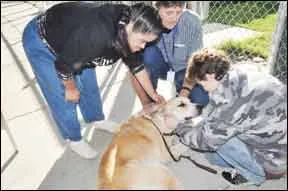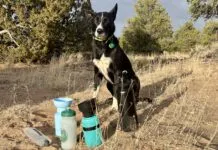Author and former president of the ASPCA Roger Caras once stated, “Dogs have given us their absolute all. We are the center of their universe. We are the focus of their love and faith and trust. They serve us in return for scraps. It is without a doubt the best deal man has ever made.” A great deal for us, but what about for dogs? As dog lovers, we know that our end of our “deal” with dogs needs to be more than “scraps.”

How can we give back to the animals that have given us so much? Becoming a volunteer at a local shelter, or donating money to a humane organization, shelter, or rescue group, are two ways to help that immediately come to mind. Shelters rarely have enough volunteers. In addition to walking, socializing, and providing basic training for shelter dogs, volunteer opportunities may include adoption counseling and administrative support. Shelters and rescue groups can always put monetary donations to good use toward food and medical supplies.
Is your life too busy to dedicate time regularly to volunteer at your local shelter? Perhaps you feel you can’t emotionally handle working with dogs in need. Maybe you don’t have enough discretionary income in this tough economy to contribute as much money as you would like. There are many other ways to help dogs that may be more suited to your interests, skills, or time constraints. Keep in mind that anything that you do for a shelter or rescue group that they don’t have to pay someone else to do results in more money left in the budget for caring for the animals. Here are some ideas for services you may be able to provide to help the animals in need in your community:
Volunteer Your Unique Skills to Your Animal Shelter
Writers, photographers, and graphic artists can help produce fliers, newsletters, or information packets. Attorneys can offer pro bono work, assist in legal research, or analyze a legal brief. Dog health professionals and groomers can offer free or discounted services. Dog trainers have a lot to offer shelters, including providing seminars for volunteers on basic positive training methods, or teaching shelter staff how to reduce barking in the kennel. Staff members may also appreciate help when dealing with particularly challenging dogs or evaluating dogs who display peculiar behavior.
All-Breed and Pure-Breed Rescue Groups Need Volunteers
…to transport dogs, deliver information packets to shelters, enlist boarding kennels and veterinarians who will discount services to rescue, bring dogs to vet appointments, and visit homes of adoption applicants for adoption approval.
Collect and Donate
Dog beds, leashes, collars, towels, food bowls, cleaning supplies, crates, toys, food, and grooming supplies are all needed at your local shelter or rescue group. Throw a party and request these items from your guests instead of the usual bottles of wines.
Familiarize Yourself with Local and State Ordinances
Learn your area’s legislation pertaining to dog welfare, including breed bans, vehicle safety, animal cruelty, chaining dogs, or retail dog sales. Write a letter, or email local and state representatives expressing your views. Forward your correspondence to dog-loving friends and family members.
Recommend Reputable Dog Trainers
Help family, friends, and acquaintances get the right resources when they get a new puppy or adopt a dog. Keep a few business cards of your favorite trainer or training business in your wallet for anyone who needs help with their dog. Every bit of “good manners” training that a dog receives helps him stay out of a shelter. Every owner you steer toward a class or trainer that uses gentle methods of training potentially saves a dog from being subjected to methods based on force and punishment.
Organize and Run a Fund-Raising Event for Your Local Shelter or Rescue
Either the organization will sponsor it, or you can form your own independent nonprofit group and donate the proceeds to several deserving shelters or rescue groups. You can organize something as simple as a bake sale or car wash, or something as involved as an athletic event (a walk, run, or swim) where participants collect donations from sponsors, a dog festival (“Bark in the Park”), or a black tie event (“Dancing for the Dogs”). Not a planner? Volunteer for an event that’s already organized.
Start a Dog Park
Well-run and monitored dog parks can be wonderful places for dogs to socialize and exercise in a safe, enclosed area. Dog parks are found on common land in residential communities, in local or state parks, or on land presented by a dog-loving benefactor for use as a dog park (subject to local zoning ordinances and restrictions).
Call Your Local Animal Control Office
Or humane society, or police department if you see a dog who is too thin; consistently without food, water, or shelter; or appears sick or infested with parasites. Officials are required to investigate if the dog’s owner is breaking local or state animal cruelty laws. Once reported, follow up. Continue to call authorities until the situation resolves. The dog can’t speak; be his voice!
Consider Being a Foster Parent to a Dog in Need
A home environment is much less stressful to a dog in transition than a noisy shelter where exercise and human attention are limited. Providing a calm and caring environment with some basic good manners training will increase your foster dog’s chances of finding a forever home.
When You are Ready to Add a Dog to Your Family, Adopt a Shelter or Rescue Dog!
If you have your heart set on a particular breed, find a reputable breed-specific rescue. Tell your friends and family about your experience, and encourage them to adopt a dog instead of purchasing one.
The number of ways to help dogs is limitless, but one of the easiest ways to give back to dogs is with your very own four-legged furball. No matter how loved, trained, cared for, or pampered our dogs are, we can almost always do better. Is your dog really getting enough physical exercise? What about mental exercise? Do you train new behaviors occasionally, play games, and provide interactive toys for enrichment? Have you been too busy lately to bring your dog to the park or arrange a play date with a best buddy? Your dog will always adore you and never complain, but we owe it to dogs to strive for every one of them to live happy, healthy, enriched lives. What better way to start than with the one who is curled up in a ball at your feet.
Susan Sarubin, CPDT-KA, PMCT, is owner of Pawsitive Fit, LLC, Puppy and Dog Training in Easton, Maryland. She’s also Maryland State Coordinator for Rhodesian Ridgeback Rescue, Inc.








